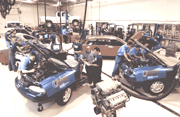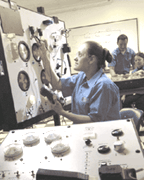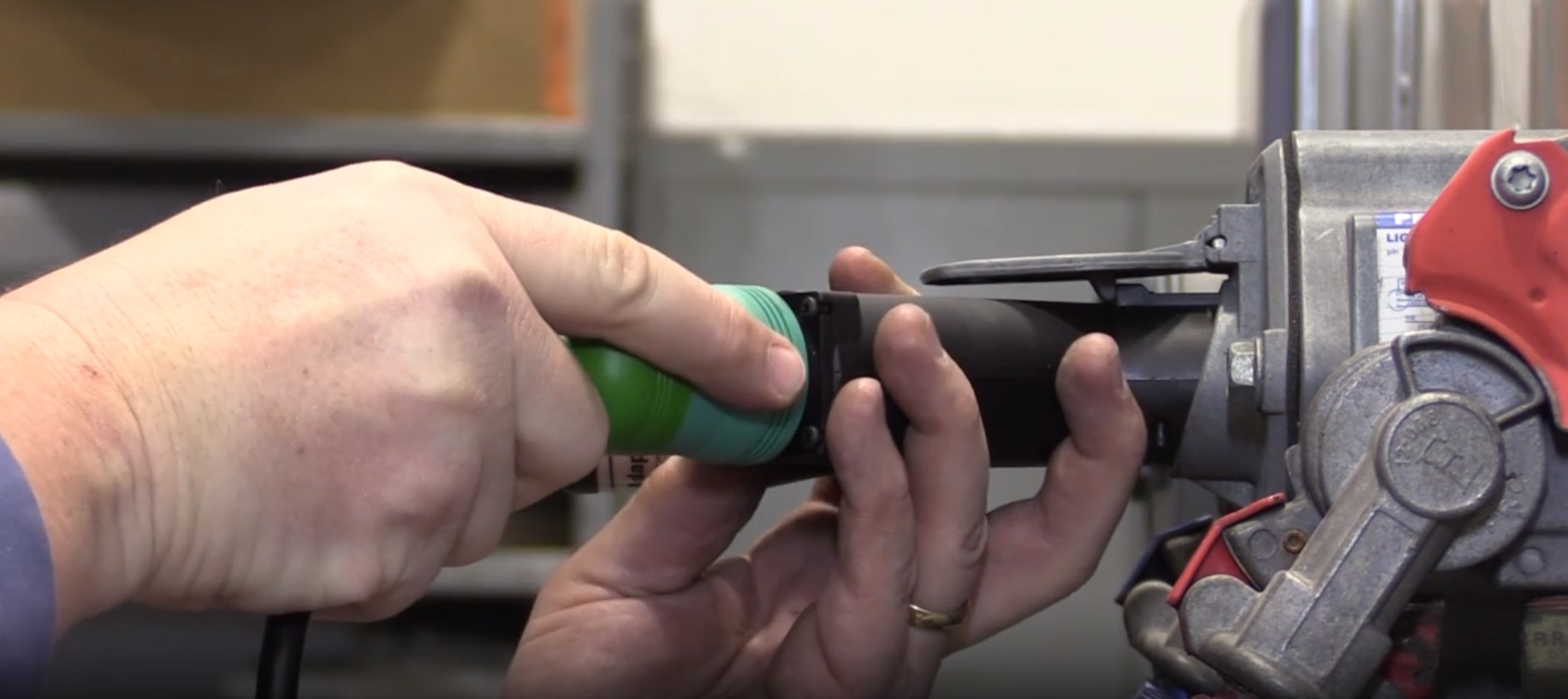These days, a scene from an automotive service bay is somewhat like a scene from an operating room. A group of highly skilled men and women meticulously pour over their work, using sophisticated instruments and finely tuned minds to diagnose and repair the complex workings of the intricate machinery before them.
 Technological advances have resulted in a new breed of automobile – modern marvels that can do everything from calculating driving directions to playing movies. Thus, as our vehicles have evolved, so have their caretakers: Today’s automotive technicians have become the brain surgeons of the automotive industry.
Technological advances have resulted in a new breed of automobile – modern marvels that can do everything from calculating driving directions to playing movies. Thus, as our vehicles have evolved, so have their caretakers: Today’s automotive technicians have become the brain surgeons of the automotive industry.
No longer nuts-and-bolts laborers, service technicians are now highly educated, computer-literate professionals who must be able to keep easy stride with the rapid advancements in their field. In addition, the role of today’s automotive service technician has expanded to include caring for customers as well as their cars. In today’s market, customer service is just as valued as technical know-how.
Driving Forces of Change
A closer look at the cars of today – and tomorrow – reveals several driving forces behind this evolution. Automotive technology changes frequently and computers have become an integral part of automotive design. About five years ago, fewer than 20% of the parts of a car were computerized. Today, this number has jumped to more than 80%, a statistic that demands technicians continue to keep pace with the newest technologies. There are typically more than 10 to 15 computers onboard a car – more computers than were on the first lunar landing module – operating everything from the engine to the radio.
Features in automobiles also have changed with the times. Our modern vehicles now include such high-tech perks as global positioning systems, Internet access, VHS-DVD players, electronic climate control, satellite radio, electric seats, airbags and more. In the future, our cars are anticipated to have even more gadgets and gizmos: BMW’s new flagship luxury 740i sedan will even feature a computer-like mouse that serves as a master control for climate, audio and cell phone functions.
 Today’s automotive technicians have to keep their eyes on the future. In addition to computers and electronics, the rise of new technologies such as alternative-fuel vehicles is also shaping the role of the service technician. As more vehicles derive fuel from the dehydrogenization of water, electric fuel cells, natural gas, solar power and other non-petroleum-based sources, technicians will need even more training to master the science behind them.
Today’s automotive technicians have to keep their eyes on the future. In addition to computers and electronics, the rise of new technologies such as alternative-fuel vehicles is also shaping the role of the service technician. As more vehicles derive fuel from the dehydrogenization of water, electric fuel cells, natural gas, solar power and other non-petroleum-based sources, technicians will need even more training to master the science behind them.
Society’s changing habits and lifestyle trends are also redefining the automobile. The way we use our cars has an impact on the way we repair them – and also on the careers of today’s auto technicians. According to R.L. Polk & Co., a premier provider of automotive information solution services, the number of vehicles on the road in America increased from 211.6 million in 1998 to 219.1 million in 2003. And since current trends show that owners are keeping their cars for longer periods of time before replacing them with more complex models, the demand for automotive service technicians is expected to continue to grow.
All these factors have created a boom in the automotive service sector, making its technicians among the most sought-after professionals today. In 2002, the U.S. Department of Labor estimated that there were approximately 818,000 working automotive technicians in the United States. What’s more, the automotive service technician workforce is expected to grow by nearly 32,000 a year during the next decade, according to a recent report from the U.S. Bureau of Labor Statistics.
Automotive Service Technicians:
Yesterday vs. Today
The need for professional technicians goes beyond sheer numbers. Manufacturers and dealers need not only more techs, they need better techs – graduates who are professional, self-motivated and service-oriented. Yesterday’s technicians got by with a solid set of tools – a jack, a wrench, a screwdriver – and an honest reputation. Today’s technicians – and those of the future – must have high-level thinking and problem-solving skills similar to avionics technicians and electrical engineers. They must have an increasingly broad knowledge of how the complex components of a vehicle work and interact, as well as an understanding of the electronic diagnostic and computer-based technical reference materials. Adept use of traditional hand tools is still important, but now this skill set must be complemented by a sharp understanding of computerized equipment as well as customer service know-how.
 Tomorrow’s technicians are in a prime position right now to take full advantage of the growing demand for technology-savvy workers. They can start by arming themselves with knowledge. The types of courses offered in automotive service technician training institutes may surprise those who are unfamiliar with this exceedingly sophisticated field. On the technician’s training plate, hand in hand with traditional courses in engines, brakes and collision repair, are courses in physics, thermodynamics, advanced diagnostics systems and electronic technology.
Tomorrow’s technicians are in a prime position right now to take full advantage of the growing demand for technology-savvy workers. They can start by arming themselves with knowledge. The types of courses offered in automotive service technician training institutes may surprise those who are unfamiliar with this exceedingly sophisticated field. On the technician’s training plate, hand in hand with traditional courses in engines, brakes and collision repair, are courses in physics, thermodynamics, advanced diagnostics systems and electronic technology.
People skills also are much more important today, and mastering these skills is another key to a successful career in the automotive industry. As cars become more sophisticated and expensive, customers demand a higher quality of service and communication from their technicians. Good interpersonal relations skills are a must – today’s service technician needs to be just as capable of working with people as he or she is at working with a fuel injector.
Perhaps the most significant development in the evolution of the automotive service technician is the evolution of the automotive service technician’s salary! According to a recent report by the U.S. Department of Labor, the median pay for automotive service technicians is approximately $30,000 to $34,000 a year, and master technicians can earn as much as $70,000 to $100,000 a year, according to a study by the National Automobile Dealers Association.
As an added bonus, job security is high in this field – after all, we can’t outsource our car repairs to other countries, and there will always be a demand for car maintenance, as well as for the skilled, sophisticated technicians to provide this service.
Steps to success
With history as a blueprint, we can only anticipate that the role of the automotive service technician will continue to evolve. Here are a few ways today’s technicians prepare for this continuing evolution:
Tap into the resources of schools that partner with specific dealers. Technicians may want to consider exploring more comprehensive training programs that are developed in concert with the industry’s top manufacturers. There are several nationwide training programs that work closely with manufacturers – such as BMW, Ford, Mercedes Benz, Audi, Volvo and more – to understand their need for quality service professionals and create training programs with these needs in mind. These relationships enable a student to make the smooth transition to a career with a reputable manufacturer, one that will invest in continued training to keep its technicians operating at a top skill level.
Take advantage of on-line courses. Balancing work with education is often challenging. Fortunately, our high-tech culture is making it easier and easier for technicians-in-training to fit their courses into their hectic schedules. Some schools allow students to do coursework online – on their own time – and receive hands-on training in the school labs. Advanced graphics and interactive computer programs enable students to learn automotive technology from the convenience of their homes and laptops, at any hour they choose, while using more of the class time for hands-on applications. As more schools implement similar programs, more technicians will be able to advance their skill levels and further their careers.
Keep training current with ongoing education. One reason skilled automotive technicians are in such demand today is because many older technicians do not keep up with the training needed for recent technological advancements. However, it’s never too late to learn. If tomorrow’s technicians place ongoing education as a top priority, the future can only yield brighter prospects and better employment opportunities for them. Training institutes for automotive service technicians are increasing all over the country. This is great news for the industry, as well as an indicator that more people are recognizing the career of an automotive service technician as a lucrative and respectable choice.
Stay abreast of current trends and future forecasts. Every day, there’s new and exciting news in the automotive field. Trade publications such as Tomorrow’s Technician can help a technician stay current on new developments in the industry. And simple tools, such as daily Internet updates and news blasts, can keep technicians informed about advances in propulsion, safety, comfort and other new automotive features that may show up in the service bay in the near future.
A Promising Outlook
The evolution of the automotive service technician is one of our job market’s biggest success stories. As recently as 20 years ago, many people incorrectly perceived the men and women who worked on their cars as simple laborers with simple tools and simple skills. Now, automotive service technicians have become our heroes – society relies on these same technicians to help translate the complex and computerized workings of our vehicles and keep us on the move. More and more jobs are also becoming available for technicians. Salaries are finally beginning to reflect the value we place on our technicians, and quality training institutes offering a high level of education in this field are becoming more common. The potential for success in this career is endless.
It’s a wonderful time to be an automotive service technician – and the future promises to be even brighter.
Kimberly McWaters is president and CEO of Universal Technical Institute, Inc., a nationwide provider of technical training for professional automotive, motorcycle and marine technicians. x


